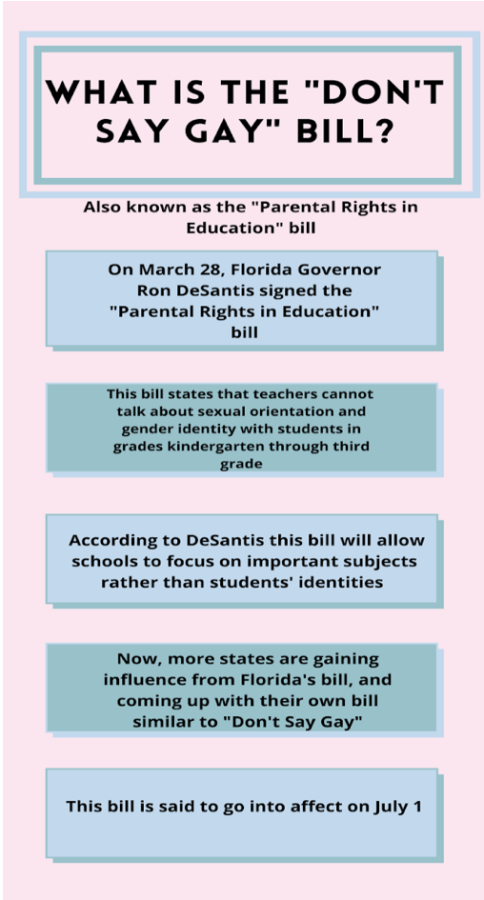Limits on LGBTQ+ instruction in the classroom
Photo credit: Katie Madigan
May 18, 2022
According to the newspaper Education Week, over the last six months, there have been over 30 bills originating in 15 different state legislatures placing new restrictions and guidelines on the discussion of LGBTQ+ topics. One of those is Florida’s widely talked “Don’t Say Gay” bill, which prohibits instruction surrounding sexual orientation and gender identity for grades kindergarten through third.
Some are questioning the constitutionality of Florida’s law, and Grosse Pointe Lawyer Karen Kienbaum says that the “Don’t Say Gay” law can be challenged as unconstitutional by proving it a violation of due process or equal protection in the 14th Amendment. Though, the unspecific wording of the bill leaves room for interpretation.
“The vague and overbroad language of the [Don’t Say Gay] law can be legally challenged,” Kienbaum said. “The law hardly provides fair notice of what is acceptable and what is restricted.”
When learning about LGBTQ+ in school through open members of the community, math teacher Bradley Smith says he found comfort and knowledge about who he is. He recalls when he was in school and his Spanish teacher, who he calls “Profe”, was openly gay, and had a photo of her partner on her desk. Smith hopes other students can see LGBTQ+ members in leadership positions as he did, and give that same encouragement to students who are questioning their sexuality or identity.
“I remember how affirming that felt because I knew back then that I was different and that I was gay,” Smith said. “Just knowing that Profe existed, and she could be who she was, made me feel so good inside.”
Some of the bills being passed recently across the country are requiring schools to notify parents if students chosen pronouns and gender idenity conflict with their biological sex. Junior Ella Chamberlain says that laws like Florida’s attack LGBTQ+ people’s rights.
“As someone a part of the LGBTQ+ community, it is taking away the most important thing in any human being: comfort,” Chamberlain said. “Coming out is something personal, it should not have to be fit into a box to match what others want.”
As Smith recognizes the value of students being able to express their identities, he also acknowledges the damage these sorts of bills may have on students, if passed.
“I get scared that legislation in other parts of the country will reach a point where you can’t talk about sexuality, and I won’t be able to share that side of my history,” Smith said. “It’s such a huge part of my life. Even just saying that ‘I am gay,’ and saying nothing more than that, has shaped so much of my perspective as a person. It was really tough growing up, and if I ever can’t talk about that anymore in a school setting, then [students] won’t have someone to look to.”
Kienbaum emphasizes that these laws contradict the overall goal of education, which is to inform students. With the implementation of legislature such as the “Don’t Say Gay Bill”, a lack of information surrounding the past and present of the LGBTQ+ community leaves students without a full understanding of the members and their history.
“Our society asks public schools to instruct on issues of relevance,” Kienbaum said. “When subjects are legally or historically relevant, all children should have age-appropriate education in them.”












